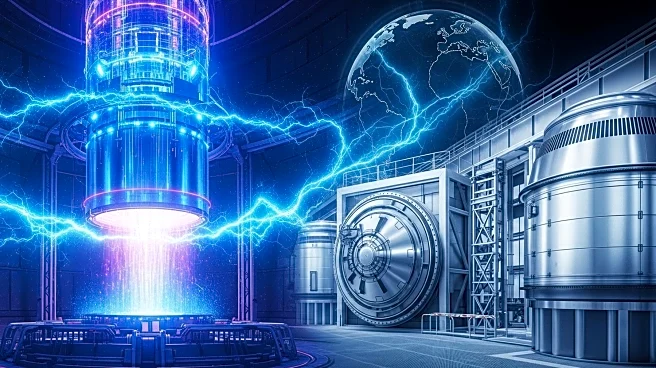What is the story about?
What's Happening?
Bill Gates has expressed optimism about the future role of fusion and next-generation fission power in the global energy portfolio by 2050. Fusion energy, which replicates the sun's nuclear fusion process, is expected to become a significant source of electricity. Gates highlights the potential of fusion to provide safe, reliable, and clean electricity, similar to fission, which currently powers 9% of the world's electricity through nuclear power plants. Gates' company, TerraPower, is developing advanced fission technology with its Natrium reactor, aiming for safer and more efficient nuclear power plants. Fusion energy, although not yet commercially viable, is progressing with companies like Commonwealth Fusion Systems working towards grid integration by the early 2030s.
Why It's Important?
The advancement of fusion and fission energy technologies is crucial for meeting the growing global energy demand while reducing carbon emissions. These technologies promise to provide abundant, sustainable energy, potentially transforming the energy landscape and enhancing energy independence. The development of fusion energy could lead to unlimited energy supply, significantly impacting economic growth and human welfare worldwide. Gates' vision underscores the importance of innovation in energy technology to address climate change and energy security challenges.
What's Next?
TerraPower's first Natrium reactor is under construction in Wyoming, with plans to begin operations by 2030. Commonwealth Fusion Systems aims to demonstrate net fusion energy within the next two years and has secured a site for its first power plant in Virginia. The successful commercialization of these technologies could lead to widespread adoption, reducing electricity costs and enabling energy access in remote areas. Continued investment and research are essential to overcome technical challenges and achieve the ambitious goals set for fusion and fission energy.
Beyond the Headlines
The development of fusion and fission energy technologies raises ethical and regulatory considerations, particularly regarding safety and environmental impact. The transition to these energy sources may also influence geopolitical dynamics, as countries seek to secure energy independence and leadership in clean energy innovation. Long-term shifts in energy policy and infrastructure are likely as these technologies mature and become integral to global energy systems.















